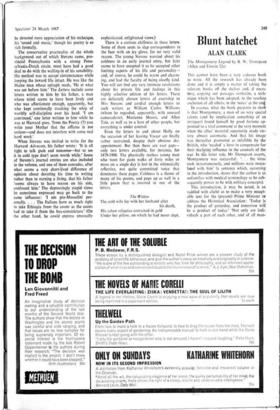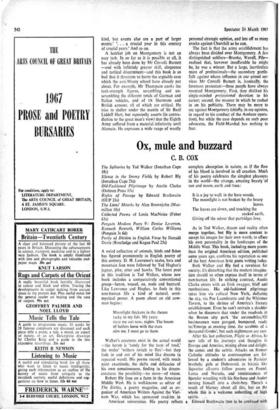The Montgomery Legend by R. W. Thompson (Allen and Unwin
32s)
Blunt hatchet
ALAN CLARK
The Montgomery Legend by R. W. Thompson (Allen and Unwin 32s) This cannot have been a very arduous book to write. All the research has already been done and it is simply a matter of taking the relevant books off the shelves and, if neces- try, copying out passages verbatim, a tech- nique which has been adopted, to the resolute exclusion of all others, in the 'notes' at the mit In essence, what the book purports to sho is that Montgomery, a man of no very special talents (and by implication something of an intriguer) found himself by good fortune ap- pointed to a vital command at the very moment when the allies' material superiority made vic- tory almost automatic. And that his image was thereafter promoted as infallible by the British, who 'needed' a hero to compensate for their declining influence in the counsels of the war. In this latter role, Mr Thompson asserts, Montgomery was successful: . . the virus took instantaneously, and millions were inocu- !Med with him' (a sentence which, occurring in the introduction, shows that the author is as unfamiliar with medical terminology as he sub- sequently proves to be with military concepts).
This introduction, it may be noted, is so raddled with cliche as to make a very accept- able text for the (present) Prime Minister to address the Historical Association: 'Today is the product of yesterday, and tomorrow will be a product of today.' Not only are indi- viduals a part of each other, and of all man-
kind, but events also are a part of larger events.". . . a crucial year in this century of crucial years.' And so on.
A hatchet job on Montgomery is not an easy task. In so far as it is possible at all, it has already been done by Mr Correlli Barnett —and with infinitely greater skill, eloquence and tactical discernment—and this book is so bad that it threatens to harm the arguable case which the anti-Monty school have already put about. For example, Mr Thompson cooks the tank-strength figures, scrambling and un- scrambling the different totals of German and Italian vehicles, and of us Sherman and British armour, all of which are critical. He tries to shelter under the mantle of Sir Basil Liddell Hart, but repeatedly asserts (in contra- diction to the great man's view) that the Eighth Army suffered from a material inferiority until Alamein. He expresses a wide range of woolly
personal strategic opinion, and lets off as many cracks against Churchill as he can.
The fact is that the army establishment has always been divided over Montgomery. A few distinguished soldiers—Brooke, Wavell, Pile— realised that, however insufferable he might be, he was a winner. But a large, inarticulate mass of professionals—the secondary gentle- folk against whose influence in our armed ser- vices Mr Correlli Barnett is, ironically, the foremost protestant—these people have always resented Montgomery. First, they disliked his single-minded professional devotion to his career; second, the manner in which he cashed in on his publicity. There may be more to say against Montgomery (chiefly, in my opinion, in regard to his conduct of the Arnhem opera- tion), but while the case depends on such poor advocates, the Field-Marshal has nothing to fear.



































 Previous page
Previous page